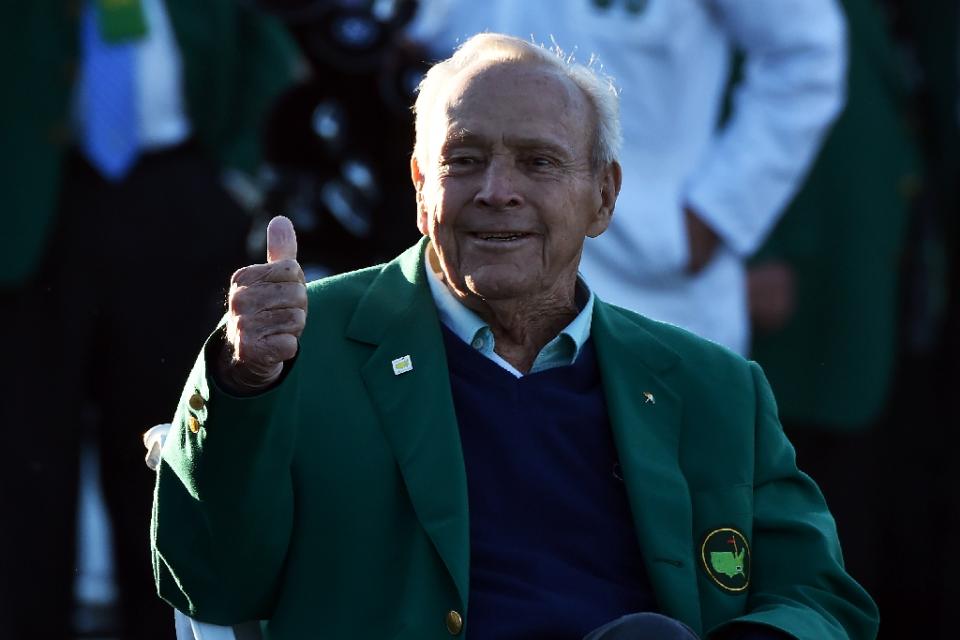Arnold Palmer was the King in so many ways
On the Sunday afternoon of Arnold Palmer’s death at age 87, Rory McIlroy hit a putt that netted him approximately $11.5 million in prize money and annuities. That might begin to explain the impact of Palmer on the business of golf and the business of sport, but even more telling is that Rory didn’t really need the money.
There have been better golfers than Palmer, although not many. There may never have been one more popular or impactful, though. Arnie’s Army they used to call his horde of fans because when he played in a tournament they descended on the event and then when he teed off, they’d troop around following his every move.
He was a phenomenon from the 1950s to the 1970s, winning 62 PGA events, seven majors and an undeniable place for golf in the modern world of sports. He played the game with abandon, complete with a full-cork driving swing and a go-for-the-pin short game.
Palmer’s daring style and magnetic personality was a natural for television, which was just beginning when Arnie started winning majors, smiling and laughing and celebrating by throwing his hat into the gallery. He was a blue-collar kid from Latrobe, Pa., the son of a greens keeper, Deacon Palmer, who taught him to follow a simple axiom.
“Hit it hard, boy,” Deacon instructed. “Go find it and hit it hard again.”
After attending Wake Forest, Palmer served in the Coast Guard and then did a stint as a paint salesman before making it in golf. He never forgot the basics.
“Wherever I was,” Palmer said, “I tried to practice the things I learned from my father in Latrobe.”
He was approachable and likeable from the height of his competitive best to his final days. As recently as 2015 he played in the Masters Par 3 contest and would hit the ceremonial first tee shot on the morning of the main event. His pre-swing thought process on what would be his final one of those?
“Don’t fan it,” Palmer said with a laugh.
Last April was the first time he couldn’t physically hit the event’s ceremonial first ball, but he couldn’t miss the event. He won four Masters, with the 1958 championship setting his career in motion. So he was still there bright and early on April 7, sitting in a chair watching Jack Nicklaus and Gary Player do the honors. Fans mobbed him anyway.
“Arnold Palmer was the everyday man’s hero,” Nicklaus said in a statement Sunday. “From the modest upbringing, Arnold embodied the hard-working strength of America.”
That was Palmer and that was one of the reasons he was able to change everything. That his popularity was so organic and ran so deep made him an early pioneer of sports figures doubling as corporate pitchmen. His commercials for Pennzoil, which often aired during golf tournaments, furthered his star power even when he wasn’t winning during the actual broadcast.
It was just one of his many business ventures. Golf course ownership. Golf course design. More commercial work. Television production. Corporate speaking. He was a founder of the Golf Channel. And of course, he wound up with a drink named after him, a beverage he still loved to order, calling them a “Mr. Palmer.”
He made just $1.8 million (non-inflation adjusted) in actual tournament winnings. He earned hundreds of millions in business outside of competition. Both figures drive the game today. He set the table for Nicklaus and Tiger Woods and others to come along and dominate on and off the course. That prize money is so great for today’s stars such as McIlroy, all stemming from Arnie making golf a television phenomenon. That McIlroy makes tens of millions a year in endorsements and other ventures before he even tees off does too.
The numbers and the dollars however can’t fully explain his impact. Palmer was a gentleman, a man always out seeking fun. Even deep into his 80s he’d give media interviews with a flash in his eye, cracking old jokes and offering big smiles. He was everyone’s loveable grandfather.

He was an ambassador for the game, promoting it all over the globe. He sought personal connections with young players and new fans. It wasn’t much different from his days on Tour, when there was almost no boundary between Palmer and his fans. It was like everyone was on the same team.
“I think the fact that the players are physically closer to the fans on the golf course, and from time to time they are privileged to talk to the fans, they have more of a relationship just through casualness,” Palmer said. “They are closer to the people that admire them and want to talk to them. The autographing isn’t something that you stand in line and do much the same as other sports where there’s, again, the contact is very little.
“In golf, an autograph is more personal I think. It’s something that actually happens and like I’m looking at you and talking and you’re asking for an autograph, that’s the way it’s done, and that makes the relationship closer.”
He was an old-school hero for the television era. He was a gutsy player when safe became a strategy. He was a regular man in a sport that forever deals with elitist barriers. He was a game changer in every way.
He was, indeed, the King; Arnold Palmer and a life fully lived.


